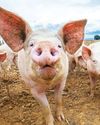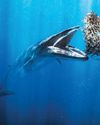
As a zookeeper, Kate Speller says that her favourite thing about her job is the relationships that she forms with the animals. She is a predator keeper, which means that she works with a range of predators including tigers, lions, cheetahs and wolverines. Although she can’t touch these animals or get hands-on while working with them, there is still a strong connection. She told The Week Junior Science+Nature, “I definitely feel like we have a very mutual respect, so they listen to us and we listen to them.”
Animal lover
Ever since she was little, Speller has always enjoyed spending time with animals. She remembers helping to look after her nan’s pets and giving her tips for caring for them. When she wasn’t caring for animals, she loved watching David Attenborough’s wildlife documentaries. She says, “I’ve always known I wanted to work with animals.”
After some time working on a farm and as a vet care assistant, Speller knew that exotic animals were the ones she was most interested in. Her local zoo growing up was Colchester Zoo, where she was able to do an internship to gain some experience. She then took a college course in animal management before she moved to the predator section at Whipsnade Zoo.
Diese Geschichte stammt aus der Issue 75-Ausgabe von The Week Junior Science+Nature UK.
Starten Sie Ihre 7-tägige kostenlose Testversion von Magzter GOLD, um auf Tausende kuratierte Premium-Storys sowie über 8.000 Zeitschriften und Zeitungen zuzugreifen.
Bereits Abonnent ? Anmelden
Diese Geschichte stammt aus der Issue 75-Ausgabe von The Week Junior Science+Nature UK.
Starten Sie Ihre 7-tägige kostenlose Testversion von Magzter GOLD, um auf Tausende kuratierte Premium-Storys sowie über 8.000 Zeitschriften und Zeitungen zuzugreifen.
Bereits Abonnent? Anmelden

Camera Obscura
Imagine stepping inside a dark room, where the only source of light comes through one small hole in the wall.

MANCHESTER SCIENCE FESTIVAL
From 18-27 October, shoppers at the Arndale shopping centre in Manchester, England, will face a giant spider.

Should musicians stop touring?
Multiple concerts travelling around the world have a big impact on the environment.

Are ghosts real?
Plenty of people believe in ghosts, but it's hard to find proof.

SMASH STEREOTYPES
In an extract from his prize-winning book, scientist and writer Adam Rutherford shows you how to use the power of science to fight racism. This chapter, titled Myth-Busting, is all about sport.

Animal awareness
What would it feel like to be another animal?

Hamza Yassin
Go behind the camera with a wildlife filmmaker.

WILDLIFE WATCH
Ben Hoare goes on a safari from his sofa to discover how nature documentaries are made.

Big bum breakthrough
A team of researchers who found out that mammals can breathe through their bottoms have won a prize at the lg Nobel awards.

A jaw-dropping undersea snap
A photograph of a Bryde's whale feeding on a heart-shaped \"bait ball\" of sardines has won the Ocean Photographer of the Year contest.